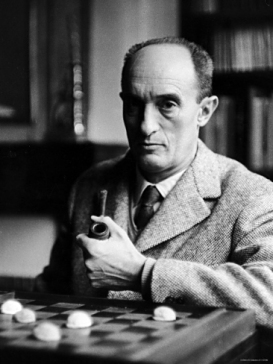
Pierre Boulle
Pierre François Marie Louis Boulle (20 February 1912 – 30 January 1994) was a French author. He is best known for two works, The Bridge over the River Kwai (1952) and Planet of the Apes (1963), that were both made into award-winning films.[1]
Not to be confused with Pierre Boileau or Pierre Boulez.
Boulle was an engineer serving as a secret agent with the Free French in Singapore, when he was captured and subjected to two years' forced labour. He used these experiences in The Bridge on the River Kwai, about the notorious Death Railway, which became an international bestseller. The film, named The Bridge on the River Kwai, by David Lean won seven Academy Awards (including Best Adapted Screenplay), and Boulle was credited with writing the screenplay, because its two actual screenwriters had been blacklisted.[2][3]
His science-fiction novel Planet of the Apes, in which intelligent apes gain mastery over humans, developed into a media franchise spanning over 55 years that includes ten films, two television series, comic books and popular themed merchandise.
Life and career[edit]
Born in Avignon, France, Pierre Boulle was baptised and raised as a Catholic, although later in life he became an agnostic. He studied at the prestigious École supérieure d'électricité (Supélec) where he received an engineer's degree in 1933.[4] From 1936 to 1939, he worked as a technician at Socfin plantations in Malaya. As fate would have it at, he met a Frenchwoman at a dinner held at his boss's residence The White Palace, she was separated from her husband, lost and lonely. She was soon to become the love of his life, to whom he would write tender love letters. She later chose to return to her husband, an official in French Indochina. During World War II she and her husband escaped into Malaya, but one of her children died in the process. Boulle would later meet her after the war, and they enjoyed a platonic friendship.
At the outbreak of World War II, Boulle enlisted with the French army in Indochina. After German troops occupied France, he joined the Free French Mission in Singapore. During the war he was a supporter of Charles de Gaulle.
Boulle served as a secret agent under the name Peter John Rule and helped the resistance movement in China, Burma, and French Indochina. In 1943, he was captured by Vichy France loyalists on the Mekong River and was subjected to severe hardship and forced labour. He was later made a chevalier of the Légion d'Honneur and decorated with the Croix de Guerre and the Médaille de la Résistance. He described his war experiences in the non-fiction My Own River Kwai. After the war he would keep in touch with his war comrades for the rest of his life.
After the war, Boulle returned to work for a while in the plantations of Socfin in Malaya , but in 1949[5] he moved back to Paris and began to write drawing from his memories of Malaya and Indochina. While in Paris, too poor to afford his own flat, he lived in a hotel until his recently widowed sister, Madeleine Perrusset, allowed him to move into her large apartment. She had a daughter, Françoise, whom Pierre helped raise, but plans for him to officially adopt the girl never materialized.
Other adaptations[edit]
The French film Le Point de mire, based on Boulle's novel Le Photographe, was released in 1977. There have also been TV films based on Boulle's novels William Conrad in 1958 (US) and 1973 (France), La Face in 1959 (US) and 1966 (West Germany), and Un Métier de Seigneur in 1986 (France), as well as the short story "Le Miracle" (from E=mc2) in 1985 (US).[10]
Another film adaptation is in production for Boulle's A Noble Profession (Un Métier de Seigneur), a spy thriller partly based on Boulle's real-life experience working as a secret agent during the Second World War. The movie is being produced by Tessa Bell and Andrea Chung.
Death[edit]
Pierre Boulle died in Paris, France, on 30 January 1994, at age 81.[11]